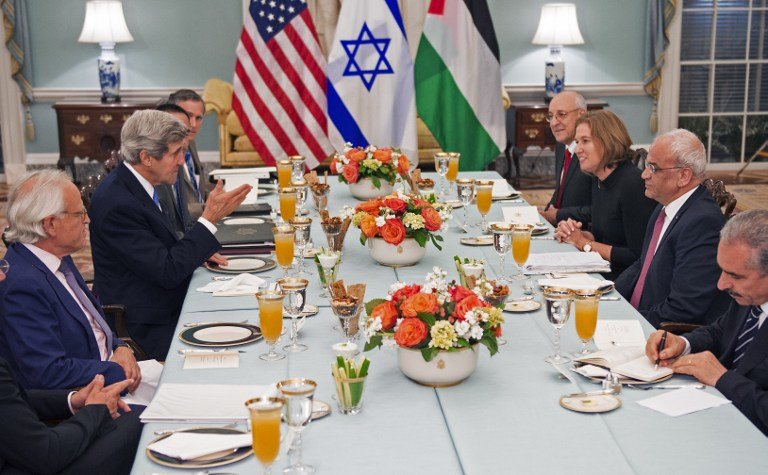SUMMARY
This is AI generated summarization, which may have errors. For context, always refer to the full article.

WASHINGTON DC, USA – Israeli and Palestinian officials were Tuesday, July 30, due to meet for a second day of direct talks as for the first time in three years they resume negotiations groping for an elusive peace deal.
US Secretary of State John Kerry was to host a second meeting between Israeli chief negotiator Tzipi Livni and her Palestinian counterpart Saeb Erakat after they first shared an iftar dinner after sundown late Monday, July 29.
“It was a constructive and productive meeting between the parties. They engaged in good faith and with seriousness of purpose,” a senior State Department official said in a statement, after the dinner lasting about 90 minutes.
“We are looking forward to continuing the talks tomorrow morning.”
In a symbolic moment of peace and tolerance in the elegant Thomas Jefferson room, the two sides feasted on a dinner of sweet corn and shell bean soup, grilled fillet of Atlantic grouper, saffron Farro risotto and apricot upside-down cake, washed down with peach and mango iced tea.
It is the first time the two sides have publicly come face-to-face since the last talks collapsed spectacularly in September 2010 over continued Israeli settlement building.
This time, Kerry who spent months shuttling back and forth to the region has insisted that the details of the negotiations be kept private to give them the best chance of success.
He was due to give a statement to reporters after another round of talks, scheduled to last some 45 minutes on Tuesday, at around 11:00 am (1500 GMT).
Officials have said that these opening talks are meant to set out procedures and the agenda for going forward, and will not go into the thorny details of such issues as borders and refugees.
Kerry was flanked at the dinner by seasoned diplomat Martin Indyk whom he named earlier as the US special envoy to the talks, and by White House Middle East advisory Phil Gordon on the other.
It is expected that Indyk will take over the day-to-day overseeing of the negotiations, moving forward.
US President Barack Obama has welcomed the start of the talks, calling it a “promising step” forward but warning of “hard choices.”
“The most difficult work of these negotiations is ahead, and I am hopeful that both the Israelis and Palestinians will approach these talks in good faith,” he said.
Obama promised the United States was ready to support both sides “with the goal of achieving two states, living side by side in peace and security.”
Kerry also warned on Monday that “many difficult choices lie ahead for the negotiators and for the leaders as we seek reasonable compromises on tough, complicated, emotional and symbolic issues.
“I think reasonable compromise has to be a keystone of all of this effort.”
The two sides have agreed to continue talking for at least nine months, a State Department official said, cautioning though that this was not a deadline.
Indyk, 62, who has twice served as US ambassador to Israel and participated in the failed 2000 Camp David summit under then president Bill Clinton, said he was taking on “a daunting and humbling” challenge.
But he insisted: “It has been my conviction for 40 years that peace is possible.”
The last direct talks collapsed in September 2010 amid continued Israeli settlement building.
Israel and the Palestinians remain deeply divided over so-called “final status issues” — including the fate of Jerusalem, claimed by both as a capital, the right of return for Palestinian refugees, and the borders of a future Palestinian state complicated by dozens of Jewish settlements scattered across the occupied West Bank.
“I don’t expect there to be a lot of quick agreements. These are people that haven’t talked together for three years essentially,” David Makovsky, expert with the Washington Institute for Near East Policy, told AFP.
“So just having them sit together and agree to a set of meetings over a 9 months period… I think our expectations should be very low.”
And he cautioned that people remained very skeptical about Kerry’s chances of success after decades of disappointment.
“The question will be at what point will he have to do the same sort of shuttling when it comes to the substantive issues as well, I would not rule that out later on.” – Rappler.com
Add a comment
How does this make you feel?
There are no comments yet. Add your comment to start the conversation.